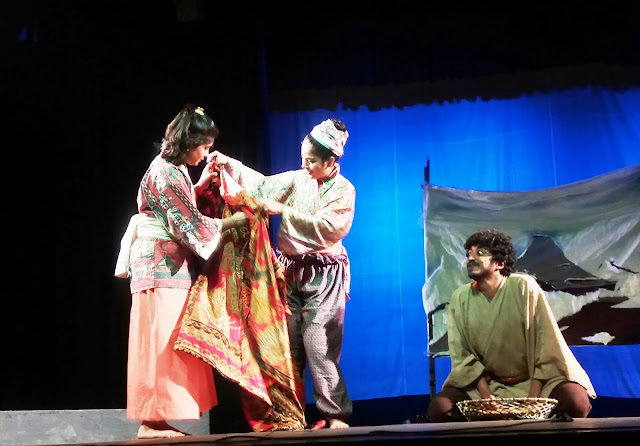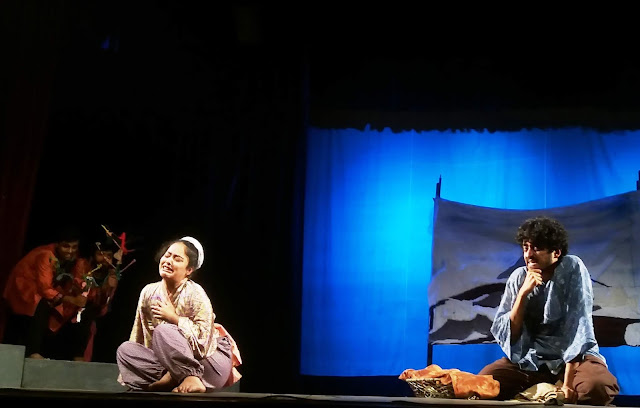Lash up on the preoccupied interpretations
"Aaina tootega tabhi toh pata chalega ki tootna kise kahte hain"

"Waisa hi dikhta hai duniya ka karishma
Jiss rang ka aankho par laga hua ho chashma"
means " You see the miracle of the world in the same colour as is of the glasses you are wearing on."
The play is as simple as that. A labourer gets a mirror as a prime item of the gift received from his employer landlord while going home that is situated far interior into a village. At home, every member sees the mirror the first time in his (or her) life and is amazed to view a human face i.e. his own face. He perceives the picture in the mirror in his own way and infers too much out of it. The different perception about what is in the mirror creates a chaos and ultimately the beautiful cohesive family is at the brink of breaking down in several pieces.
The head of the house, the father looks his face in the mirror and takes it for his father, He cries that his father has come after such a long time to meet him. He is very protective about the mirror as he don't want to risk his company with his loving father. His son sees his own face and thinks that it is that young hunter who has hypnotised his beloved sister. So he also plans to marry by going to the town and bringing a lovely bride for himself. The daughter casts her sight on the mirror and finds a beautiful young girl i.e. acutally her own picture. She is wondering as how his father has brought a young girl in his older age ignoring her mother. The mother views the mirror and is confident that there is her competitor i.e. a mistress of her husband in it. See curses the picture describing it a witch and hag having an ugly old face. She wages a war against her husband for ditching her.
The relevance of the story is much more nowadays when even a rape crime and murder is interpreted in different colours by different political parties of our great country. This play lashes at the prevalent tendency of preoccupied interpretation by the so-called learned class. The sight of the self-proclaimed erudite and aware class is so blurred today that they don't see the happenings in their true contexts and don't feel the sufferings it mean for the masses.
Though in the hindsight, it must be mentioned that the story also narrates the way human relationship disintegrates routinely today just because of misunderstanding and unacceptability of other's beliefs and values.
Put up in a Japanese setup, the presentation was made in a style of spectacle where there were many characters in action beyond the main scene reacting on and sometimes even intruding into the main spot. This all made the play more humoristic. But the important factor behind adopting this method was to stretch the play to one hour or more that might otherwise would have been summed up in twenty minutes. So, they tactfully resorted to overacting and protrusion of the story.
The audience remain seated to watch the play because of its comedy appeal of the mimicry done at multi-times higher intensity.
Sudhir, Arti, Anil Khattar, Manoj Kumar, Mansi Joshi, Kashish, Akash, Meharin Saba, Hingoran and Prince Mishra acted in this play. And they have only choice to follow the instruction of the director and they truly did it well. Essentially a director's presentation, this play served the message in its bizarre manner thoughtfully crafted to bring forth the objective in spurts of laughter. The director Kiran Deep Sharma of the Khilona Theatre, New Delhi should get an acclamation with an alert about overacting USP (unique selling point)
..............
Review by - Hemant Das ;Him;
Photographs by - Binay Kumar
Email for response - editorbiharidhamaka@yahoo.com.



































































No comments:
Post a Comment
अपने कमेंट को यहाँ नहीं देकर इस पेज के ऊपर में दिये गए Comment Box के लिंक को खोलकर दीजिए. उसे यहाँ जोड़ दिया जाएगा. ब्लॉग के वेब/ डेस्कटॉप वर्शन में सबसे नीचे दिये गए Contact Form के द्वारा भी दे सकते हैं.
Note: only a member of this blog may post a comment.